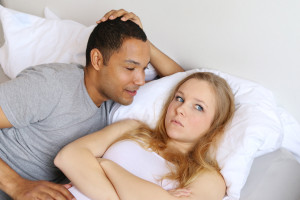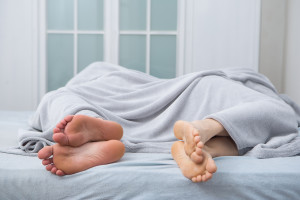By Iris Farrou
24 Sep, 2023
Lifestyle Tips, Menopause, Mental Health, Peri-Menopause, Queer Health, Reproductive health, Sexual health, Women's Health
Anxiety, asexual, asexuality, assault, boyfriend, Buffalo NY, Depression, exhaustion, fear of intimacy, fiancé, girlfriend, how to be a supportive partner, how to bring up low sex drive, husband, intimacy fears, lack of intimacy, Low libido, low sex drive, medications that kill sex drive, meds, mental health interfere with sex drive, OB/GYN, OBGYN, overwhelmed, partner, PTSD, sexual trauma, talk to my doctor about low libido, what is a healthy sex life, why does my partner not want to have sex, why is my libido gone, wife

This may be a touchy subject for many women, as on the one hand a lot of us experience low sex drive, but on the other hand we don’t talk about it! The issue becomes more complicated when healthcare providers don’t even ask us about our libido, yet hypoactive sexual desire disorder (HSDD) is quite a common issue women deal with. Additionally, many psychologists, primary healthcare providers and OBGYNs are trained to care for and treat HSDD. HSDD is defined as the absence of desire for sexual activity and/or sexual fantasies– we most often just refer to it as “low libido,” and like anything else, it can have its ebbs and flows. Lack of sex drive can be frustrating in a relationship, but it is a normal thing to be experiencing, it can be traced back to causes, and it doesn’t mean that it’s permanent or that you do not love or are attracted to your partner.
What Causes It?
Especially in women, low libido can be attributed to hormonal changes or imbalances: this can be during the menstrual cycle as estrogen and progesterone levels rise and lower, during menopause when our estrogen levels dramatically drop, in the case of a total hysterectomy, during pregnancy, or if you have PCOS–just to name a few examples.
Another common reason for low libido in women are mental health issues, as well as medications. Depression and anxiety, PTSD, and past sexual trauma can negatively affect a woman’s desire for sex. Many times, the medications used to treat mental health issues can worsen an already low libido. This does not mean an important medication should be stopped, but you can–and should–bring it up with your therapist or mental healthcare professional.
Life stressors, chronic stress, and fatigue can minimize the body’s natural sexual urges. This is even more prevalent in new mothers, or families with young kids: the everyday exhaustion, lack of sleep, and constant worry simply leave no room for sexual intimacy, or desire thereof.
What Can We Do?
If one partner has low or no interest in sex while in a healthy relationship, remember it is a team effort: it is not up to the partner who has low libido to “solve” the issue and magically become better.
- The first thing to consider and talk about, even if it’s uncomfortable, is relationship issues. Your partner’s desire for sex, or how safe they feel, may be affected by something in the relationship neither of you knew was an issue until you really examined it and talked about it.
- If you and/or your partner face mental health issues, it is important to carefully consider how those may be affecting your sex life. Especially if you take any medications, look into the side effects and talk with your therapists about how they could be affecting your sex drive, and solutions to balance that out.
- Redefine intimacy in ways that work for you, and where sex is not the goal or the starting point. You may plan a romantic date, do small daily things to lessen stress, or start with small affectionate gestures to help strengthen your romantic bond.
If you feel that your lack of interest in sex is related to a more serious health issue, either physical or mental, or to a serious issue in your relationship that you have not communicated about, it may be a good idea to seek out professional help and support. HSDD is not uncommon, and many medical professionals can assist you with it; you know your body and life circumstances best, and with a bit of assistance you will be able to get to the root of the issue much more effectively.
More
Reasons Women Experience Low Libido
 When you’re not in the mood, you don’t feel like you. Feelings of self-doubt can add stress and insecurity to your already complicated emotions as you start asking yourself, “What’s wrong with me?” Don’t let such questions impact your self-esteem. There are a variety of reasons why women experience low libido, that doesn’t have anything to do with whether or not they are a good partner. If you’re worried that you may not be in the mood for sex as frequently as you once were, read on for common explanations for this change in desire.
When you’re not in the mood, you don’t feel like you. Feelings of self-doubt can add stress and insecurity to your already complicated emotions as you start asking yourself, “What’s wrong with me?” Don’t let such questions impact your self-esteem. There are a variety of reasons why women experience low libido, that doesn’t have anything to do with whether or not they are a good partner. If you’re worried that you may not be in the mood for sex as frequently as you once were, read on for common explanations for this change in desire.
What’s Wrong with Me?
Before you start to worry that what you’re experiencing is not natural, know that there is a very real explanation for feeling a loss of libido. Hypoactive sexual desire disorder (HSDD) is the most common form of sexual dysfunction in women. It is defined as a deficiency or absence of sexual fantasies and desire for sexual activity that causes marked distress or interpersonal difficulty. HSDD is a condition experienced by 30 percent of women ages 18 to 59, which means you’re not alone in feeling an unexplainable loss of desire.
What Causes HSDD?
There are a variety of mental and physical factors that cause HSDD:
Physical Factors
- Low testosterone levels.
- Some medical conditions, such as endometriosis, fibroids, thyroid disorders, arthritis, cancer, diabetes, high blood pressure, coronary artery disease (CAD), and some neurological diseases.
- Certain medications such as antidepressants, blood pressure lowering medications, oral contraceptives, and some anti-seizure medications.
- Age.
- Menopause.
- Fatigue.
- Pregnancy, having recently given birth, or breastfeeding.
- Recent surgery, especially a procedure that impacted your breasts or genital tract.
Emotional Factors
- Depression, anxiety, or other mental health conditions.
- Stress.
- Peer pressure.
- Pressure to meet unrealistic sex standards set by pop culture or the media.
- Personal beliefs.
- Poor body image.
- Low self-esteem.
- History of physical or sexual abuse.
Lifestyle Habits
- Overconsumption of alcohol.
- Use of recreational drugs.
- Smoking.
Relationship Factors
- Interpersonal relationship issues.
- Partner performance issues.
- Poor communication of sexual needs.
- Sexual problems such as difficulty orgasming or pain during sex.
How do I Know if I’m Experiencing HSDD?
Symptoms of HSDD may include:
- Lack of sexual thoughts.
- Lack of sexual desire.
- Distress or relationship issues caused by lack of sexual thoughts or desire.
Can it be Treated?
The good news is that thanks to recent advancements and research, there are treatments available that have been proven effective in helping to kick-start the female libido. The type of treatment that will be most impactful for you will depend on the woman and the factors impacting her HSDD, however, proven treatment options include:
- Testosterone therapy.
- Changes to prescribed medications (note: always talk to your doctor before making any changes to your prescription medication usage or dosage).
- Sex therapy/relationship counseling.
- Treating underlying medical or mental health issues.
If you feel you may be experiencing HSDD, or if you have any questions or concerns regarding your sexual desire, talk to your doctor. He or she can help you understand the underlying factors impacting your libido and can help you determine the treatment plan that’s right for you.
More
 Some days you’re just feeling off. Maybe you feel slightly less motivated, or you just feel down, or disinterested. If you’re having such feelings in the bedroom, and you’re finding that the feelings have lasted for more than a few weeks, you may be in a sex slump. If you are experiencing low sex drive, don’t panic. Such temporary feelings can be caused by a variety of factors and your doctor can help you recover.
Some days you’re just feeling off. Maybe you feel slightly less motivated, or you just feel down, or disinterested. If you’re having such feelings in the bedroom, and you’re finding that the feelings have lasted for more than a few weeks, you may be in a sex slump. If you are experiencing low sex drive, don’t panic. Such temporary feelings can be caused by a variety of factors and your doctor can help you recover.
Sex Drive Factors
As women, our sex drives are complicated. There are several factors that impact our desire for intimacy, including our:
- Overall state of health and wellness
- Emotional well-being
- Past experiences
- Personal beliefs
- Lifestyle choices
- Current relationship state
With so many factors impacting the desire for sex, feelings of low sexual desire can have a variety of causes. Consider the following:
- Illness. Illnesses such as arthritis, cancer, diabetes, high blood pressure, coronary artery disease, neurological diseases, and mental health issues such as depression and anxiety and reduce sexual desire.
- Side effects of medications. Antidepressants and anti-seizure medications in particular can negatively impact libido.
- Lifestyle habits. Those who don’t lead a healthy lifestyle can experience low sexual desire. For example, an overconsumption of alcohol, smoking, and the use of street drugs can impact libido.
- Fatigue. Even when caused by a hectic schedule, sometimes our bodies are too physically exhausted to produce feelings of sexual desire.
- Pregnancy and breast-feeding. A woman’s hormones change significantly during and after pregnancy. Such changes can reduce feelings of desire.
- Menopause. During menopause, estrogen levels drop, which can cause decreased interest in sex. Some menopausal women even experience painful or uncomfortable sex due to other physical changes in their bodies, further leading to sexual disinterest.
- Relationship issues. Interpersonal problems can manifest into very real, very physical symptoms. When you and your partner are not emotionally in synch, it can make it difficult to be physically in synch.
How to Reclaim Your Sexual Desire
If you are in a sex slump, know that it does not mean a permanent change. Talk to your doctor and consider these solutions:
- Make healthy lifestyle choices. Exercise regularly, make sure you get enough sleep, maintain a healthy diet, work to reduce stress, and reduce your amount of alcohol.
- Consider alternate medications. Talk to your doctor if you suspect a medication may be impacting your libido. He/she may be able to make a recommendation for a different medication that may not have the same side effects.
- Consider counseling. If the issues with your libido are emotional, or if they are caused by relationship problems with your partner, your doctor may recommend therapy or counseling.
- Ask your doctor about hormone therapy. Receiving supplemental estrogen may help to improve your mood and stimulate sexual desire. Be sure to talk to your doctor about the potential risks and side effects of hormone therapy as well.
Low sex drive can be caused by factors that are physical, emotional, and hormonal, but that doesn’t mean you can’t control your libido. If you have been experiencing a sex slump, talk to your doctor today about potential treatments and solutions to help you reclaim control in the bedroom.
More



